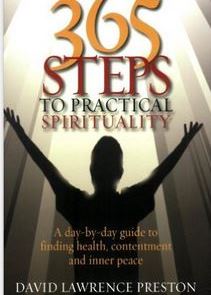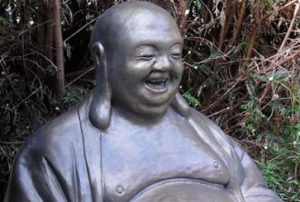‘Meditate and be mindful, and all else will follow.’
The Buddha
Meditation means ‘to focus one’s thoughts’, ‘give attention to’ or ‘engage in contemplation or reflection’. Anyone deep in thought is meditating. Whenever our thoughts are focused on a particular idea we enter a meditative state.
The biggest obstacle to entering this peaceful state is the busy mind, but with practice the mental chatter is subdued and even silenced.
Another obstacle is the intellect – the need to know, to think and to analyse. Meditation is not about getting results, nor is it ‘guided visualisation’. Meditation is simply controlled mental activity which leads to mental stillness.
The power that ultimately shapes and directs our lives is non-physical, i.e. spiritual. Only your spiritual, non-physical, self has the power to really think – not what superficially passes for thought (which is often nothing more than remembering or reacting to habits and old conditioning), but genuine creative and intuitive ‘thought’. This is the only way it can influence you, since it has no physical power. It is the source of your inner power – and meditation helps you make the connection.
Until now, if you are typical of most people, you have probably been so absorbed in your day to day thoughts and activities that you have not given much attention to this inner ‘something’, but if you want to become a fully functioning being and live life to the full, you must be in harmony, mentally, emotionally, physically and spiritually.
The Benefits of Meditation
‘All of man’s troubles arise from his inability to sit quietly in a room alone.’
Blaise Pascal
In the West, meditation was once believed to be the preserve of gurus and mystics. It conjured up images of shaven-headed monks in brightly coloured robes sitting cross-legged on the floor. However, many people – including many business leaders and TV celebrities – have taken up meditation. They recognise that it’s vitally important for physical and emotional wellbeing to have some quiet time to yourself each day.

Health benefits
Meditation helps rejuvenate mind, body and spirit, so you can cope better with time pressures, the demands of others, and fatigue. It puts you in charge of your own mind, frees you from past programming and conditioning, and detaches you from fears about the future.
An undisciplined mind is constantly at work, but its activity is largely aimless and unproductive. Restless thoughts come and go, frittering mental energy.
Using biofeedback and other equipment, Dr Herbert Benson, an American physiologist, found that meditation brings about many beneficial changes. In his book, ‘The Relaxation Response’, he described how he induced Alpha and deep Theta levels in his subjects and observed long-lasting health improvements.
- Meditation helps to reduce stress-related health conditions, including headaches, gastric problems, muscular aches and pains, back and neck tension and immune system deficiencies such as hay fever and asthma.
- People who meditate frequently have more energy and need less sleep. They are less prone to insomnia.
- It relieves depression and helps with other emotional problems. Doctors who teach meditation find they reduce their prescribing of medication.
- Research has also shown that regular meditation can slow down the aging process. Practitioners look and feel younger.
- Meditation can also be a powerful tool to combat degenerative illness. E.g. cancer patients have achieved remission, and arthritis sufferers have reduced pain and swelling in their joints.

Performance enhancement
- Sportsmen and women know the importance of a quiet mind if you want to achieve peak performance.
- Students meditate to help them learn more efficiently, improve memory and cope better with examination stress.
- Busy people who stay cool, calm and focussed perform better. Regular meditators can stand back from crises and see the bigger picture. They work better under pressure and find they can think more clearly.
- Entertainers who meditate, including public speakers, feel more relaxed and at ease when performing.
- It can also improve creativity by balancing the left and right hemispheres of the brain.
Emotional Benefits
With daily practice, meditation can help you to:
- Become more even tempered, happier, less grumpy, less irritable, and more loving.
- Build self-confidence and become more outgoing.
- Discover a sense of freedom from ‘negative’ emotions, e.g. if you’re a parent, you’ll cope better with fractious youngsters and employees become less angry with a difficult boss.
- Reflect on your experiences, make sense of them, and understand the lessons you need to learn.

Spiritual benefits
Meditation puts you in touch with your Deepest Self. It helps you to gain self-knowledge, find guidance from within and develop a more harmonious relationship with the world around you. The skills are acquired gradually, but in time, meditation:
- Brings calmness and stability to the world around you (it rubs off on other people).
- Puts you in touch with yourself as a being of compassion, peace and love.
- Brings you into awareness of a powerful inner guidance which helps you to develop your full potential.
Experienced practitioners often report a feeling of connectedness with all things when they meditate, as if all the boundaries which divide people from each other melt away. They feel part of a great universal whole – the ultimate state of bliss. And it is within the reach of everybody.
Whatever you want out of life, meditation can enable you to succeed. And it is not necessary to find a guru or pay huge sums for a mantra. The techniques are easily learned and you can practise in your own living room.
©David Lawrence Preston, 20.6.2016

Follow me on Facebook and Twitter @Feelinggoodatt
www.feelinggoodallthetime.com

How to Books, 2007






